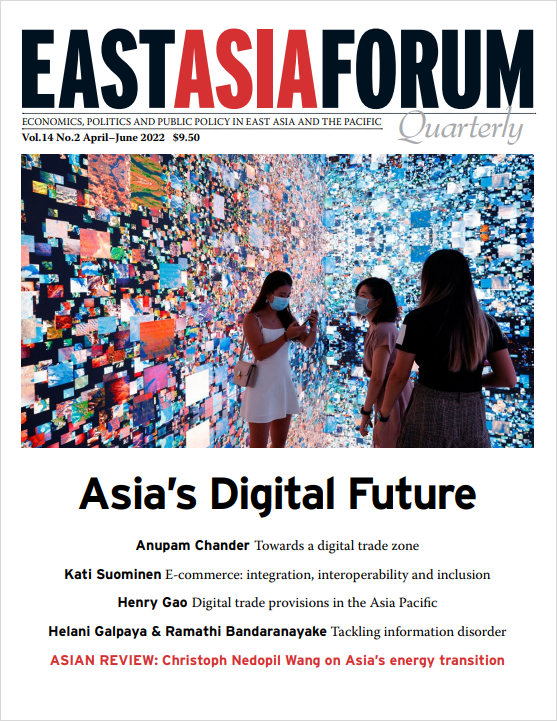Digital trade
East Asia Forum Quarterly Vol. 14 No. 2: Asia's Digital Future
Published 21 June 2022
Asia is not sitting idle in the face of potential fragmentation of digital policies. While it's too early to assess whether efforts towards working solutions will lead to regulatory alignment, the region demonstrates that finding commonalities is possible. Sponsored by the Hinrich Foundation, this edition of the East Asia Forum Quarterly examines where commonalities are possible in the digital economy and where we may expect more clashes than cross-cutting frameworks.
Once, the internet and world wide web promised a world of seamless connectivity for anyone with access to a digital device. As connectivity costs fell, the workplace became mobile, and digitalisation transformed industrial sectors, the laissez-faire agenda of digital developmentalists appeared to align with and promote democratic ideals.
That was then. Today, even as cloud computing and digital transformation agendas have become mainstream, it is clear the threat of digital fragmentation must be actively addressed. As different rules around privacy, cybersecurity and digital sovereignty emerge to thwart interoperability, fragmentation is impacting both governance and infrastructure. Digital borders in China, cross-border data restrictions in Europe and America’s disavowal of Chinese telecom equipment make for increasing disconnection.
What does the future look like? Competing digital blocs reflecting mercantilist history? Or an interoperable environment, that blends the opportunities of e-commerce and artificial intelligence with the analogue realities of a carbon-based economy into some type of ‘metaverse’?
Asia is not sitting idle. Much of the early effort towards working solutions has taken place among the region’s multilateral fora. The regional E-Commerce Agreement ASEAN signed in 2019 established common principles and rules for e-commerce growth and potentially heralds a digital ‘common market.’ ASEAN’s Model Contractual Clauses for cross-border data transfers, adopted in 2021, breaks ground by enabling ASEAN markets to trade in sensitive data without disrupting domestic privacy requirements.
The Digital Economic Partnership Agreement struck by Singapore, New Zealand and Chile, and the Singapore–Australia Digital Economy Agreement focus on enabling digital trade and the necessary components of digital transformation. It’s still too early to assess whether there’s alignment across the frameworks—or if they are a panacea for digital fragmentation.
But Asia shows that finding commonalities is possible. The articles in this EAFQ examine where commonalities are possible in the digital economy, and where we may expect more clashes than cross-cutting frameworks. We face an opportunity to choose the latter for the next generation of trade application. Each article explores a particular component of that choice.
Meanwhile, our Asian Review articles remind us that state owned enterprises in developing Asian countries can play a bigger role in green financing and that Indonesia’s G20 presidency is crucial to global food security. These are additional opportunities for Asia to find commonalities.
***
Articles from this issue:
- Towards an Asian digital trade zone
- Integrating networks for regional trade agreements
- Biden’s united front targets China’s fight for silicon supremacy
- Top priority for Indonesian leadership of G20 cooperation
- Bridging the digital divide
- Metaverse — the latest chapter of the Splinternet?
- Integration, interoperability and inclusion
- Digital provisions play a key role in Asia Pacific agreements
- Addressing the digital divide in ASEAN
- Asia and digital neo-mercantilism
***
This editorial note and the Quarterly in its entirety was originally published on the East Asia Forum website. In addition to EAF editors Peter Drysdale and Shiro Armstrong as well as the entire East Asia Forum editorial team, the issue was co-edited by:
- Peter Lovelock, Principal of Fair Tech Institute, Access Partnership
- Dini Sari Djalal, Associate Director (Editorial), Hinrich Foundation.
© The Hinrich Foundation. See our website Terms and conditions for our copyright and reprint policy. All statements of fact and the views, conclusions and recommendations expressed in this publication are the sole responsibility of the author(s).








